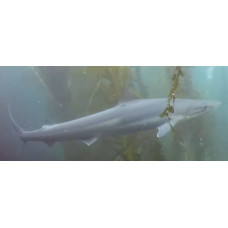Latin name
Hemitriakis leucoperiptera
Other names
Hemitriakis leucoperiptera
Identification
They have a rather elongated muzzle with a wide arched mouth. The body is "humped", stocky. The eyes are oval, horizontally elongated and have a lower third eyelid. There is a prominent ridge under the eyes. The nostrils are framed by short skin folds. The number of vertebrae is 133-146.
Teeth
Flattened teeth have a protruding central point and small distal teeth.
Features of fish fins
The first dorsal fin is longer than the second, but considerably shorter than the caudal fin. Its base is posterior to the base of the pectoral fins. The base of the second dorsal fin is in front of the base of the anal fin. The anal fin is smaller than either dorsal fin. There is a ventral notch near the edge of the upper lobe of the caudal fin. The caudal fin is almost horizontal.
Fish colouring
The upper side of the body is grey with a brown tinge, the underside is pale. There is no dark band on the underside of the snout. Juveniles have dark patches on the caudal fins.
Distribution
Endemic to the western Pacific.
Habitat
Marine, bottom dwelling, tropical species. They live off the coast of the Philippines at depths of up to 48m.
Size
Maximum fixed length 96 cm.
Behavior
The species was discovered and described long ago, but much remains unknown about its lifestyle and behaviour.
Food and feeding habits
Coastal predator.
Reproduction
There are 12 cubs in a litter, with a minimum size of 20-22 cm at birth. Probably reproduces by placenta-free live birth. Embryos feed exclusively on egg yolk.
Fishing
Occasionally found in the catches of Philippine fishermen.
Relationship with a person
They are not dangerous to humans. Local people eat the meat of these sharks as food.
| Classification | |
| Phylum | Chordata |
| Class | Chondrichthyes |
| Squad | Carcharhiniformes |
| Family | Triakidae |
| Genus | Hemitriakis |
| Species | H. leucoperiptera |
| Features | |
| Conservation status | Critically Endangered |
| Habitat | Bottom |
| Life span, years | No information |
| Maximum body weight, kg | No information |
| Maximum length, cm | 96 |
| Sailing speed, m/s | No information |
| Threat to people | Edible |
| Way of eating | Predator |
Whitefin topeshark
Tags: whitefin topeshark

